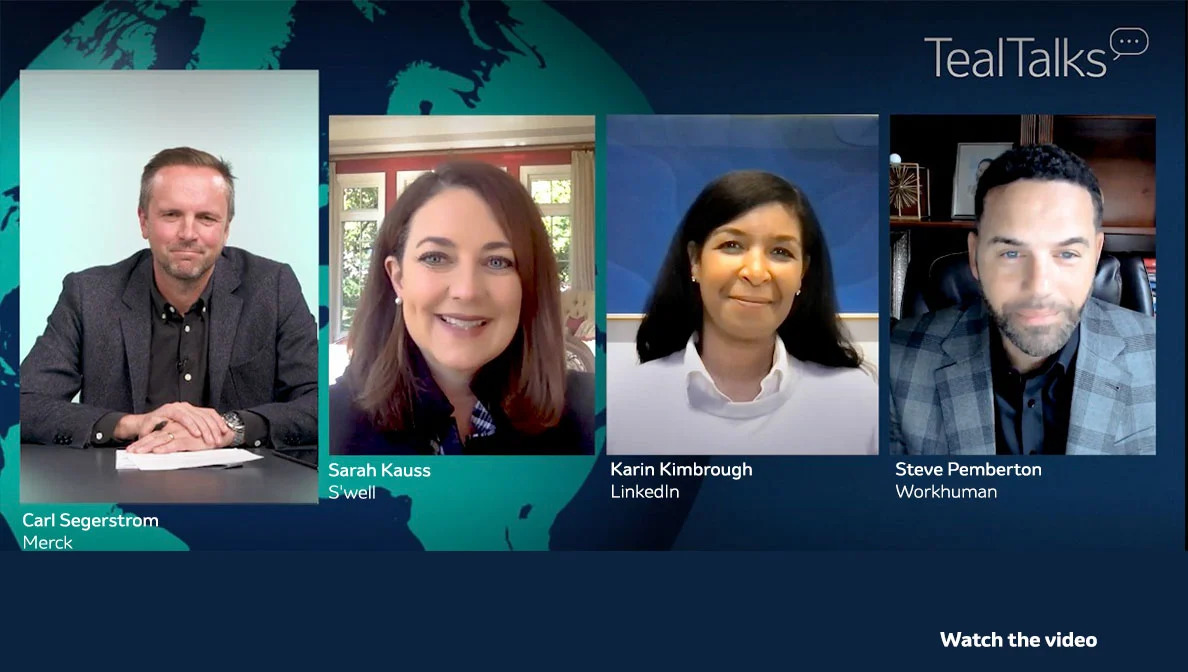Merck Video: What the “Great Resignation” Taught Us About Workplace Culture
In this Teal Talks episode, Merck's chief talent officer sits down with leaders from LinkedIn, Workhuman and S’well to discuss how businesses can adapt to a new era of work
Published 12-22-22
Submitted by Merck & Co., Inc.
The global workforce is going through a significant transformation. In 2021, an unprecedented number of workers quit their jobs. What started as an economic trend called the “great resignation” has spurred lasting workplace changes.
“It’s redefining and recalibrating the relationship between employee and employer, and more specifically, what the employee feels is the employer’s responsibility to them,” said Steve Pemberton, chief human resources officer, Workhuman.
In episode seven of Teal Talks, Pemberton, along with Karin Kimbrough, chief economist at LinkedIn, and Sarah Kauss, founder of S’well, sits down with Carl Segerstrom, chief talent officer, Merck, to discuss the ongoing changes in the workplace and how businesses can continue to support the growth and development of their employees.
Why are workers quitting their jobs and where are they going?
A Pew Research Center survey found that low pay, a lack of opportunities for advancement and feeling disrespected at work were the top reasons Americans quit their jobs in 2021.
A desire to work from home in remote jobs is also driving some of the turnover in the labor market, Kimbrough said.
“Nearly half of all applicants on our platform apply for at least one remote role. And this is up from an infinitesimally small number pre-pandemic,” said Kimbrough. “So, one thing everyone is looking for is that flexibility, and a lot of that comes through remote or hybrid opportunities.”

Finding purpose at work
Research has shown that employees want purpose in their professional lives that merges with their personal values.
In a recent survey, more than half of U.S. employees said they’d be willing to take a pay cut to work at a company that shares their values.
Kauss, whose company was founded with a mission to rid the world of single-use plastics, has seen the benefits of this purpose-led mindset.
“I was very surprised by the caliber of employees that were choosing to come to a smaller startup like S’well because of our purpose,” Kauss said.
What is “quiet quitting”?
Quiet quitting, the popular term that gained global attention through a viral TikTok video, is when employees stop going above and beyond in their jobs and do the bare minimum. Some experts say quiet quitting is a residual effect of the COVID-19 pandemic, burnout and the “great resignation” because it helped make employees feel empowered to take control of their work-life balance.
“I think what’s indicative is whether or not employers are going to meet humans halfway in their recalibration of what work looks like, how it’s done, where it’s done, and with whom it’s done.”
-Steve Pemberton
Although many believe the choice of leaving a company may be in the hands of employees during the “great resignation”, Kimbrough said LinkedIn data is starting to show a hiring slowdown and an increase in the mention of “layoff” in their feed.
“To some, quiet quitting may mean getting the basic job done, but in these uncertain economic times, quiet quitting can mean lower productivity for the whole company, and it could push employers to let workers go,” she said.
The “great resignation’s” silver lining
We have arguably seen some of the largest disruptions to the workforce and workplace in decades, but positive developments can be found. “I think the most positive thing that has come out of this time is the increasing emphasis on social issues and how important individuals are to leading great teams and to making positive change in the world,” said Kauss.
Learn more about Merck’s Environmental, Social & Governance (ESG) approach by visiting merck.com/company-overview/esg.
View original content here

Merck & Co., Inc.
Merck & Co., Inc.
At Merck, known as MSD outside of the United States and Canada, we are unified around our purpose: We use the power of leading-edge science to save and improve lives around the world. For more than 130 years, we have brought hope to humanity through the development of important medicines and vaccines. We aspire to be the premier research-intensive biopharmaceutical company in the world – and today, we are at the forefront of research to deliver innovative health solutions that advance the prevention and treatment of diseases in people and animals. We foster a diverse and inclusive global workforce and operate responsibly every day to enable a safe, sustainable and healthy future for all people and communities. For more information, visit www.merck.com and connect with us on Twitter, Facebook, Instagram, YouTube and LinkedIn.
More from Merck & Co., Inc.

